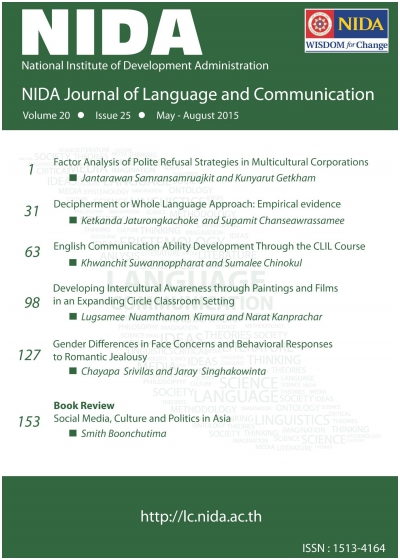Factor Analysis of Polite Refusal Strategies in Multicultural Corporations
Keywords:
politeness strategies, refusal situations, communication accommodation theory, cross-cultural studies, multicultural corporationsAbstract
This study explored politeness strategies in refusal situations among Westerners and Asians within 22 multicultural corpo+rations located in Thailand. A questionnaire to examine seven politeness strategies was developed from Brown and Levinson‘s (1987) five politeness strategies. Co-workers of six different status levels, divided by social distance and power relations (Close Equal Co-workers, Not Close Equal Co-workers, Close Junior Co-workers, Not Close Junior Co-workers, Close Senior Co-workers, and Not Close Senior Co-workers), participated in this study. Data collected from 200 questionnaires were analyzed using the following tools: factor analysis, One-way Analysis of Variance (ANOVA), independent-Sample T-testing, and multiple regression. The triangulation of interview data was analyzed and divided into eleven categories. For types of politeness strategies, a factor analysis showed that indirectness was mainly used by all types of co-workers. Results of ANOVA showed that three significant differences in the politeness strategic use among all status levels were dinner invitations, offering a ride, and request for things. Dating invitation refusal situations were not statistically different due to the participants‘ accommodation of an opposite culture. A multiple regression revealed that among six variables (native language, social distance and relations, age, exposure to Thai culture, education, and work experience), social distance and relations was the most influential whereas native language and work experience were not powerful predictors. Although the independent-Sample T-test showed no significant difference between two cultures, the interview findings revealed the dissimilarities cross-culturally. Socio-cultural norms and communication accommodation theory clarified the self-adjustment to another culture, and the influence of norms and society could be the most significant feature of the different types of politeness strategies among the status of each co-worker in multicultural corporations.Downloads
How to Cite
Issue
Section
License
By submitting a manuscript, the author transfers the copyright for the article to School of Language and Communication, National Institute of Development Administration (NIDA), if and when the manuscript is accepted for publication. Though the journal is an open-access, reproduction of any material published in NIDA Journal of Language and Communication for non-personal and/or commercial purpose requires a written permission from School of Language and Communication, National Institute of Development Administration (NIDA).






